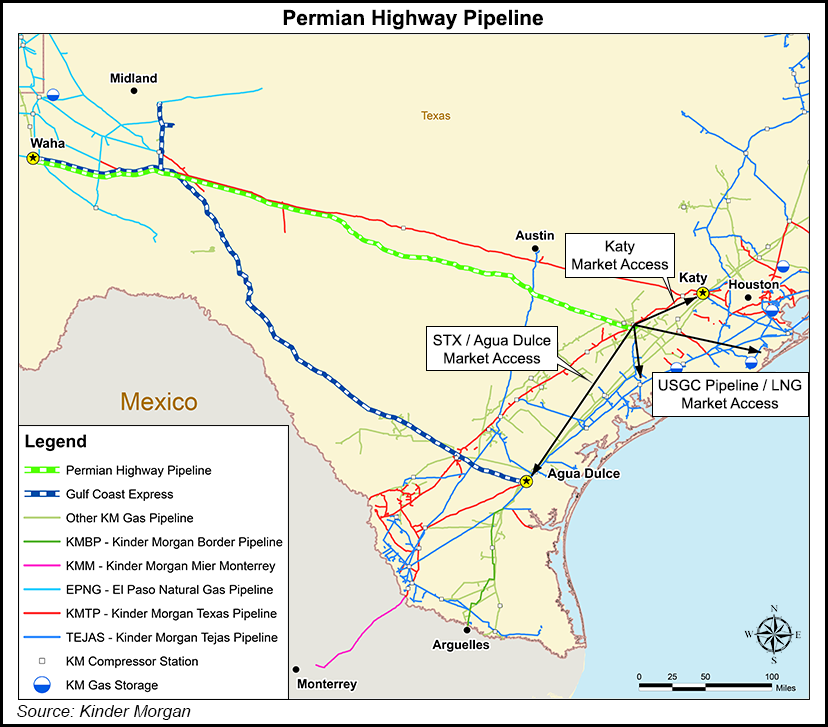Regulatory | Infrastructure | NGI All News Access | NGI The Weekly Gas Market Report
Texas Court Tosses Challenge to 2 Bcf/d Permian Highway Pipeline
Kinder Morgan Inc. may begin work on the Permian Highway Pipeline (PHP), a 2 Bcf/d, $2 billion system designed to transport natural gas to the Gulf Coast, a Texas court ruled Tuesday.

The Travis County District Court’s decision, pending appeal, crushed a challenge by landowners to the licensing process at the Railroad Commission of Texas (RRC), which allows pipeline operators to determine the route and acquire land without a landowner’s consent.
Judge Lora Livingston on Tuesday wrote that the RRC is not required to set standards to route pipelines or to regulate private land takings. The RRC allows pipeline operators that qualify as “utilities” to use eminent domain to acquire land for the public good.
“The court finds no authority for the proposition that the legislature has granted authority to the commission to oversee the rights granted,” Livingston wrote. Kinder Morgan’s request to dismiss the lawsuit also was granted.
The 42-inch diameter pipeline, which could be in service by late 2020, was sanctioned last year by Kinder Morgan Texas Pipeline LLC and EagleClaw Midstream Ventures LLC. Altus Midstream Co., which owns most of Apache Corp.’s gas-rich assets in the Alpine High in West Texas, in May acquired a 26.7% stake.
PHP would move gas through a 430-mile pipeline from the Waha hub to Katy, west of Houston, with connections to the Gulf Coast and Mexico markets. Shippers already committed include EagleClaw, Apache and XTO Energy Inc., a subsidiary of ExxonMobil Corp.
Plaintiffs sued to block construction, arguing the RRC had not sought public comments or properly supervised the pipeline’s route, which would move gas through the iconic Hill Country. They argued that PHP would cross “sensitive environmental features,” including endangered species habitats, sites of historical significance and residential subdivisions.
Kinder’s Tom Martin, president of natural gas pipelines, said the Houston-based operator was encouraged by the ruling.
“The court’s finding validates the process established in Texas for the development of natural gas utility projects, as well as the steps we have taken to comply with that process,” he said. “We will continue to engage all stakeholders as we work to complete PHP.”
The state’s eminent domain process “ensures that no single landowner can block critical infrastructure necessary to moving the energy needed to heat and cool homes, schools, businesses and public buildings in Texas, while providing substantial local and state revenues.”
Throughout PHP’s development, “the route has been carefully evaluated to minimize potential impacts to the environment and landowners, while also being cost-effective and constructible.” According to Kinder, PHP is expected to provide nearly $1 billion/year in additional revenue to the state and its counties “to support local schools, first responders and other vital needs. Additionally, individual leaseholders are projected to receive more than $2 billion/year in new oil and natural gas royalties.”
Hays County, the City of Kyle and three landowners filed the lawsuit in April, claiming that the process for determining the route of natural gas pipelines violated the Texas Constitution. The plaintiffs also sued the RRC in Sansom et al v. Texas Railroad Commission et al, No. D-1-GN-19-002161, in the 345th District Court for Travis County.
“This ruling is in line with well established Texas precedent regarding the constitutionality of the eminent domain process and the substantial safeguards that the process provides to Texas landowners,” said Baker Botts LLP partner Bill Kroger, whose firm represented Kinder.
“This was the most important oil and gas pipeline case pending in the state, and we are happy to have achieved such a great result for our clients.”
The Texas Real Estate Advocacy and Defense Coalition, a landowner advocate, said it is considering an appeal and “additional legal actions in other venues to challenge this severely problematic route.”
Kyle Mayor Travis Mitchell called the ruling “unfortunate but not unexpected…We will be working to determine the best path forward. We’re certainly not giving up.”
© 2024 Natural Gas Intelligence. All rights reserved.
ISSN © 1532-1231 | ISSN © 2577-9877 | ISSN © 1532-1266 |
